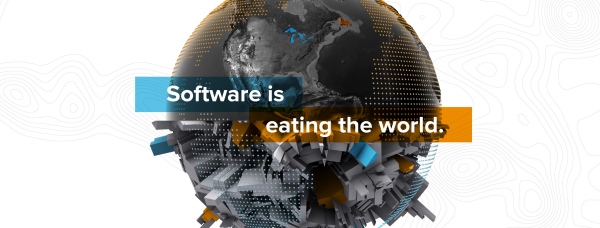Ten years ago, software was eating the world. Now...
Now, it could get worse. Just faster. Or…

Exactly ten years ago Marc Andreessen explained “Why Software Is Eating The World”.
This year, a worldwide semiconductor shortage has accelerated that ongoing meal, by greatly increasing the pressure for many industries to "[reduce] the number of physical components used and [implement in software] functions that had historically been done in hardware."
A recent interview by Stacey Oniot summarizes how and why this is happening, and concludes with a silver lining: “that pressure usually leads to real innovation, which is exactly what we need right now."
Why are we short of chips, again?
If there is one thing we urgently need is real innovation, not the crap currently overvalued by most investors. No question about that. And tough times surely stimulate creativity. The problem is to steer it in the right direction, at the right level, and for stuff that is necessary.
The COVID-19 pandemic has made the chip shortage worse and faster than expected in many ways, but did not create it: “Electrification of vehicles and the internet of things were two driving forces behind the resurgence of chip sales heading into 2020."
What happens if software eats more world, for no good reason?
The effects of software on society can be hugely good or hugely bad. This post celebrates the tenth anniversary of Andreessen’s essay by reminding a couple of the bad things, for the common good.
First, if recent history teaches us anything, more software means more concentration of power where it should never stay, that is in the hands of hardly accountable organizations.
The other thing is that maybe, just maybe, a non-negligible part of all that pressure on semiconductors that would make software eat more world is just hype, that sooner or later will backfire badly.
Ask yourself: how much of that pressure is caused by wishes of so many cars that it would be impossible to produce or even use all of them as advertised? How many things in the Internet of Things are embarrassing, polluting crap that should never exist? Stuff like this or this, for example?
The first thing on which the current shortage of semiconductors should put serious pressure is not semiconductor design. It is unrealistic, and above all unnecessary or toxic promises. That would be real innovation. After that, we could and should turn to real innovation in and by sofwtare. Only after.\
Who writes this, why, and how to help
I am Marco Fioretti, tech writer and aspiring polymath doing human-digital research and popularization.
I do it because YOUR civil rights and the quality of YOUR life depend every year more on how software is used AROUND you.
To this end, I have already shared more than a million words on this blog, without any paywall or user tracking, and am sharing the next million through a newsletter, also without any paywall.
The more direct support I get, the more I can continue to inform for free parents, teachers, decision makers, and everybody else who should know more stuff like this. You can support me with paid subscriptions to my newsletter, donations via PayPal (mfioretti@nexaima.net) or LiberaPay, or in any of the other ways listed here.THANKS for your support!